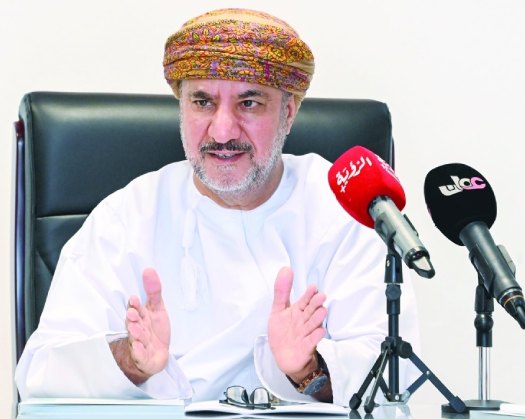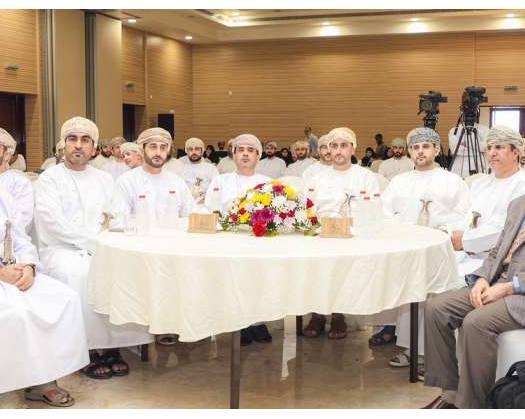The Oman Human Rights Commission (OHRC) received and recorded a total of 1,006 cases in 2024, including 47 petitions and 22 reports, with 937 cases receiving legal aid. These cases encompassed a wide spectrum of civil, political, economic, social, cultural, environmental, and development rights, as well as the rights of disadvantaged groups.
This was revealed during a press conference on Monday by the Oman Human Rights Commission, which detailed its major achievements in 2024, including monitoring and receiving complaints, responding to regional and international reports, and planning internal and external activities.
Dr. Rashid bin Hamad al Balushi, Chairman of the Oman Human Rights Commission, told the media on Monday that the commission will continue to fulfill its national role in safeguarding and promoting human rights, guided by its mandate and the ideals enshrined in the State's Basic Law and international conventions to which Oman is a signatory.
He reaffirmed the commission's commitment to improving its operational processes and strengthening its position as an independent national institution dedicated to fostering a culture of human rights, citizenship, justice, and human dignity in Oman.
Dr. Al Balushi stated that the mission of the organization is to act as an effective national platform to promote and safeguard human rights in all segments of society and institutions. Its goal is to inculcate a human rights culture, encourage its practice, and defend those rights in conformity with local and international rules and norms.
He praised the Royal Oman Police's efforts to protect human rights, notably in the services offered to prisoners and detainees. During field visits to the central prison, the commission discovered that health, educational, judicial, athletic, training, recreational, and hobby-related services all satisfied acceptable standards.
During the press conference, he addressed the National Human Rights Strategy and monitoring its execution with all appropriate human rights agencies. The goal of the Omani Human Rights Commission is to establish a complete framework that promotes and protects human rights in the Sultanate of Oman, in accordance with the Basic Law of the State, international treaties and agreements to which Oman has acceded, and relevant regulations. During the current year, the committee conducted workshops as part of the strategy project to review the existing position of the plan. These seminars addressed a variety of fundamental rights, including civil and political, economic and social, environmental, cultural, and the freedom to engage in public life. They also prioritized underprivileged groups, including as women, children, the elderly, and individuals with impairments.
The plan project corresponds with Oman Vision 2040's national objectives. To verify that the strategy is consistent with broad development programs, direct coordination was established with the Vision Implementation Followup Unit and the Ministry of Economy.
The chairman stated that the committee is reviewing documents and talking with appropriate agencies to resolve them using procedures that would ensure a prompt and effective response.
The committee also organized a celebration on International Human Rights Day, with the theme Pillar of the Nation: Sustainable Steps to Protect and Promote the Rights of Older Persons. The celebration centered on valuing the role of elderly people and their contributions to society, emphasizing Oman's attempts to safeguard their rights, guarantee their access to necessary services, and improve their social status through legislation and laws that protect them from neglect or abuse. The festival also attempted to promote community knowledge about senior citizens' rights and ensure their full engagement in all areas of life.
Dr. Rashid said in a statement to the Observer on the committee's progress in caring for the elderly in foster families: "Regarding the rights of the elderly in the Sultanate of Oman, the committee visited the elderly centre in the Wilayat of Al Rustaq and held a special symposium on the services provided to the elderly, in which it issued a set of recommendations. Oman is recognized for its policies that protect the social structure, and promoting families is one of the initiatives aimed at maintaining social unity and integrity.
Furthermore, the committee made several field trips to the central prison and the detention facilities of the Royal Oman Police to examine the services given to convicts and detainees and to verify that they were in line with human dignity standards. Within the framework of the 2024 pardon for convicts, several royal decrees were issued ordering the release of a group of prisoners from the Central Prison who had been convicted on various charges. The Royal pardon included around 704 inmates, both citizens and residents.
In terms of freedom of expression, the committee observed that Oman has climbed 18 spots in the 2024 Press Freedom Index, published by Reporters Without Borders, compared to 2023. This index evaluates 180 nations yearly based on five factors that determine press freedom: the political, legal, economic, social, cultural, and security environments.
The committee also held numerous field meetings with institutions working in the area of the right to healthcare, such as the Royal Hospital and Khoula Hospital, to explore obstacles and opportunities in improving service quality and guaranteeing access for all, particularly persons with disabilities. It also made a field visit to the Duqm Industrial Zone to assess the services and labor care available to people working in the Duqm Special Economic Zone. It evaluated compliance with protection regulations, a positive work environment, and overall compliance of the facilities utilized with occupational safety and health measures and international standards for workers' housing.
The committee fulfilled its mission of safeguarding and advancing the rights of people with disabilities. It tracked and investigated warning signs for the blind in public venues. The committee presented the study's findings to Muscat Municipality and the Ministry of Housing and Urban Planning, and Muscat Municipality responded that the study would be considered and incorporated into the municipality's future projects. The committee also received a response from the Ministry of Housing and Urban Planning, indicating that special rules will be incorporated into the national urban planning standards included in the results of the National Urban Development Strategy. The study will also be incorporated into the Sultanate of Oman's construction standards and specifications handbook.
OHRC presented its comments on the United States' annual report on the human rights situation in the Sultanate of Oman for 2023 in the international arena. The study addressed a number of themes. The study aimed to confirm the concerns and reports received and to provide the commission's views on them in accordance with the Sultanate of Oman's current laws and regulations, as well as the procedures and methods used by the commission in this respect. It also responded to a BBC Africa Eye story titled How a Malawian WhatsApp group helped rescue women trafficked to Oman. The study described incidents of more than 50 Malawian women who were trafficked to Oman to work in conditions akin to slavery.
Dr. Al Balushi said that the commission responded to various international governmental and nongovernmental reports, including Amnesty International's 2022/2023 Annual Report on human rights in Oman, the US State Department's 2023 Annual Report on human rights in Oman, and its 2023 Trafficking in Persons Report, which assessed Oman's antitrafficking efforts in 2022.
The OHRC is committed to producing a parallel report to the Arab Charter on Human Rights Committee, utilizing the same approach as in preparing reports for both the Omani Human Rights Commission and the Arab Charter on Human Rights Committee. This study was prepared using a consultative approach, engaging relevant civil society groups, stakeholders, and partner organizations. During the months of October and November 2024, the committee met with five civil society groups that were relevant to the report's themes, including: the Omani Women's Association in Muscat, the Omani Journalists Association, the General Federation of Oman Workers, the Children First Association, and the Omani Association for Persons with Disabilities.








